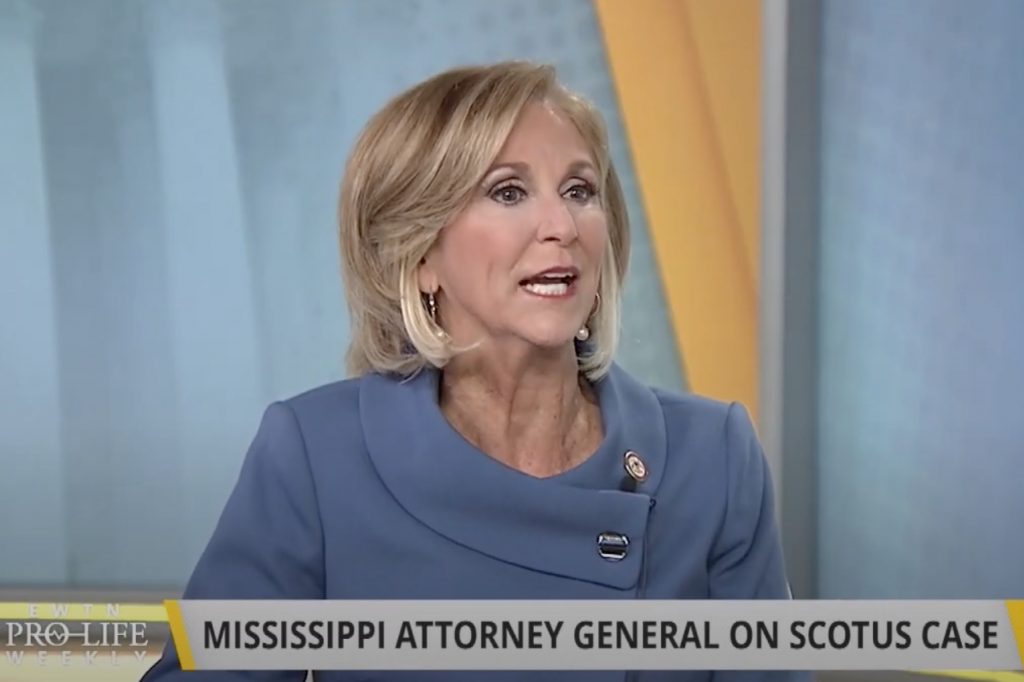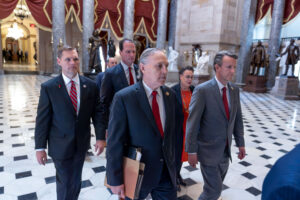Ending most legalized abortions will “empower” more women to pursue careers while also raising children, Mississippi Attorney General Lynn Fitch told a Catholic television host late last week. She is asking the U.S. Supreme Court to overturn Roe v. Wade, the landmark 1973 decision that guarantees women the right to abortion before fetal viability, when the state defends its 15-week abortion ban in December.
“Think about this: the lives that will be touched, the babies that will be saved, the mothers that will get the chance to really redirect their lives,” Fitch told EWTN Pro-Life Weekly host Cartherine Hadro on Sept. 24. “And they have all these opportunities that they didn’t have 50 years ago. Fifty years ago, professional women, they really wanted you to make a choice. Now you don’t have to. Now you have the opportunity to be whatever you want to be.
“You have the option in life to really achieve your dream and goals, and you can have those beautiful children as well.”
Fitch made similar arguments in a court brief this summer as part of Dobbs v. Jackson Women’s Health Organization, which centers on Mississippi’s 15-week abortion ban. A Jackson federal judge in 2018 and the 5th U.S. Circuit Court of Appeals in 2019 struck down the 15-week ban based on the precedents of Roe and a 1992 case. Both precedents, Fitch argues, were wrongly decided.
In the Mississippi brief, Fitch notes that the Roe decision suggested unplanned pregnancies could result in financial hardship for women.
“Now take factual developments. First, modern options regarding and views about childbearing have dulled concerns on which Roe rested,” Fitch’s July brief said. “Roe suggested that, without abortion, unwanted children could ‘force upon’ women ‘a distressful life and future.’ But numerous laws enacted since Roe—addressing pregnancy discrimination, requiring leave time, assisting with childcare, and more—facilitate the ability of women to pursue both career and success and a rich family life.”
In the past, though, Fitch has acknowledged that women do not have economic equality in Mississippi—the only state in the nation that does not have a law guaranteeing equal pay for women. In February 2017 while she was still the state treasurer, Fitch pointed out that Mississippi and Alabama were the only states without an equal pay law.
“I’d really like for us to beat Alabama on this one,” Fitch said at the time.
Two years later, in 2019, Alabama passed its equal pay law, leaving Mississippi as the one state without one. During the two legislative sessions since, multiple equal pay bills in the state House and Senate have failed.
Economists: Fitch’s Claims ‘Particularly Bizarre’
On Sept. 20, 154 economists filed a brief rebuffing Fitch and Mississippi’s claims that social progress since Roe v. Wade has made abortion no longer necessary for pregnant women in the U.S.
“Mississippi’s celebration of parental leave policies is particularly bizarre, as the United States is one of only two countries without a national paid maternity leave policy,” the economists wrote. “While scores of countries, including Bulgaria and Latvia offer more than a year of paid leave to new mothers, the United States provides for only twelve weeks of unpaid leave under the Family and Medical Leave Act of 1993 (‘FMLA’). Making matters worse, half of all working women are not covered by FMLA due to various exemptions.”
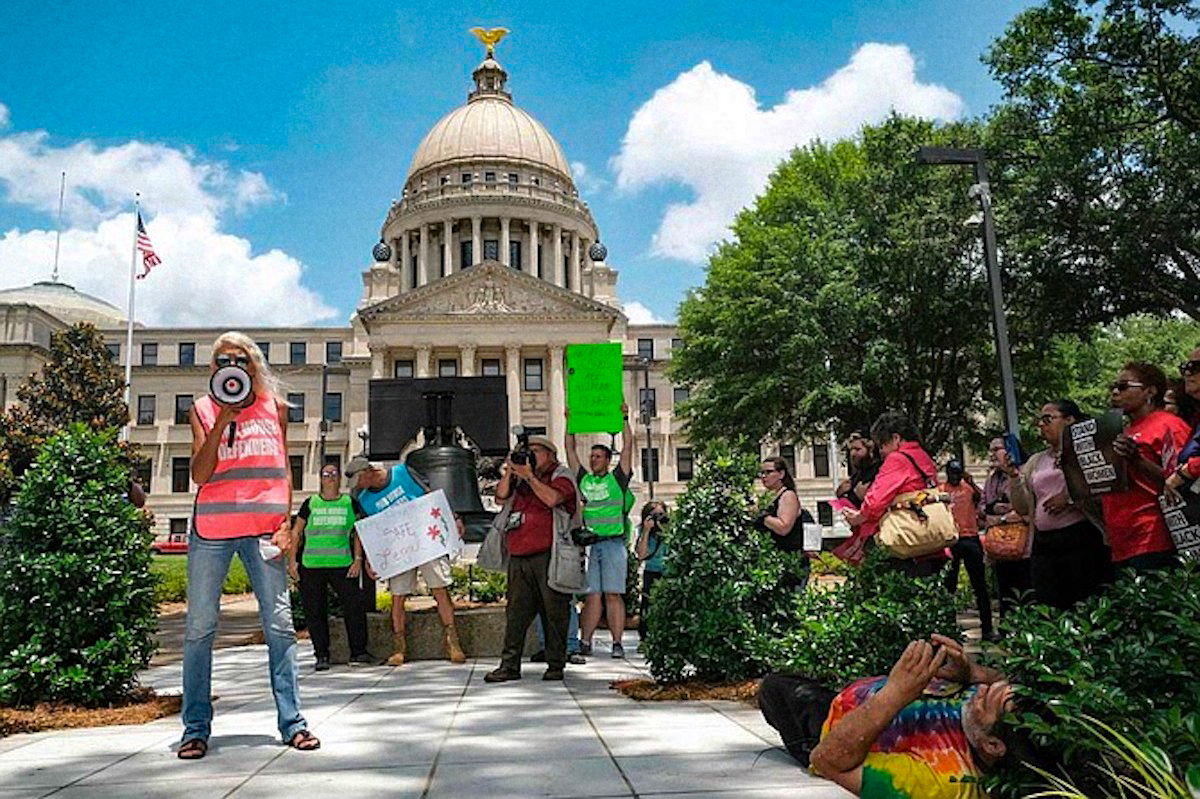
The nation’s offerings for women are so meager, the economists said, they “have concluded that the FMLA has had no significant effect on women’s employment or wages.”
“Mississippi’s claims about childcare fare no better,” the economists wrote. “The real (inflation-adjusted) price of childcare has increased by nearly 50% since 1993, to a median price of $10,400/year for infants and $6,500/year for four-year-olds. Thus, a hypothetical mother working full-time and making $15 per hour—which is more than double the federal minimum wage—faces infant childcare costs that total one-third of her gross pay.
“The U.S. Department of Health and Human Services defines ‘affordable childcare’ as less than 7% of family income, but there is only one state in the country, Louisiana, where daycare costs qualify as ‘affordable’ under that rubric. Further, federal childcare programs are underfunded and reach only about 1 in 6 eligible children.”
On Sept. 20, Mississippi Today reported that “thousands of Mississippi parents” lost child care benefits in recent months amid the COVID-19 pandemic “even while the state hoards over half-a-billion in unspent federal child care dollars.” That happened after the Mississippi Department of Human Services’ Child Care Payment Program forced recipients to go through a “redetermination” process that deemed many ineligible for reasons such as working 24 hours a week instead of the requisite 25.
Another issue with Fitch’s claims, the economists’ brief says, is that many working mothers have work schedules “that are erratic or misaligned with daycare hours.”
“For instance, a recent survey of workers in the food service and retail sectors—which together employ nearly 1 in 5 American workers—indicates that 80% have little to no input in their work schedules, 66% receive less than two weeks’ notice of their schedules, 69% are required to keep their schedules ‘open and available,’ and 70% report being asked to make at least one change to their schedules in the past month,” their brief says. “These unstable and unpredictable work schedules create significant barriers to securing reliable childcare.”
The economists also took aim at Fitch’s claim that the federal Pregnancy Discrimination Act of 1978 has increased pregnant women’s opportunities.
“Despite the protections the PDA appears to confer on paper, a new study estimates that about 250,000 pregnant women are denied accommodations related to their pregnancies each year,” they wrote. “Moreover, research suggests that the PDA has actually reduced women’s wages and employment overall because it has made employers reluctant to hire women. Thus, Mississippi’s suggestion that employment policies and childcare access have solved the challenges for working mothers is completely unsupported.”
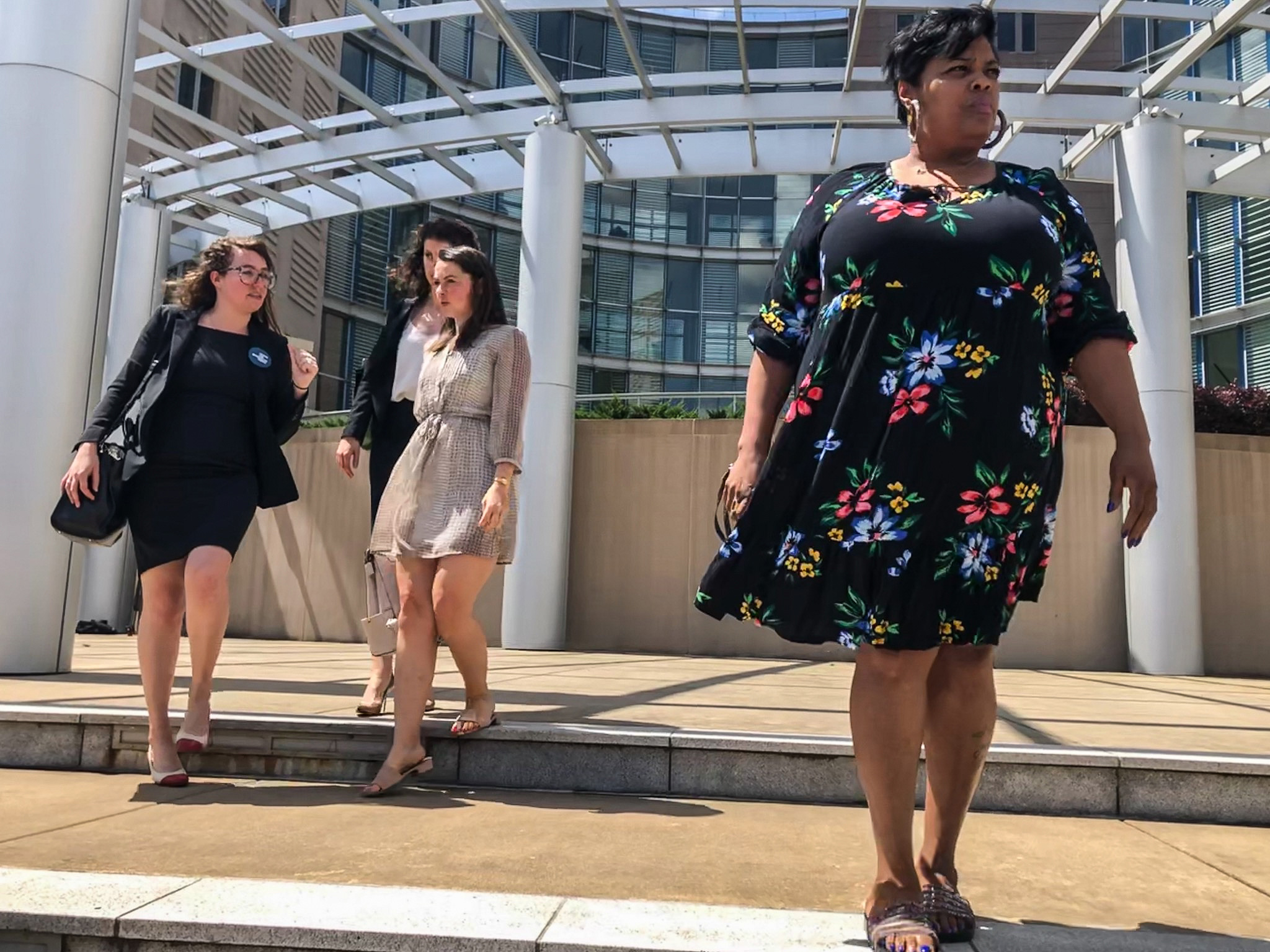
About 75% of women seeking abortions, the economists wrote, are “low income”; 59% already have children; and 55% “report a recent disruptive life event such as the death of a close friend or family member, job loss, the termination of a relationship with a partner, or overdue rent or mortgage obligations.” Those women, the economists note, “overwhelmingly lack access to paid maternity leave or to affordable childcare.”
One 2020 study published by the National Bureau of Economic Research examined the difference in outcomes for 536 women who “arrived at abortion facilities just prior to a gestational age cutoff and were able to obtain an abortion” compared to “women who arrived just past this cut-off and were turned away.” The researchers found the women in the “turnaway group” faced significantly higher rates of financial hardship.
“The authors demonstrated that, up until the point they sought abortions, financial outcomes were trending very similarly for the near-limit and turnaway groups,” the economists explained in their Sept. 20 brief.
“Then, exactly at the point in their lives where one group obtained an abortion and the other group was turned away, the turnaway group began to experience substantial financial distress relative to the near-limit group, such that over the subsequent five years, the average women in the turnaway group experienced a 78% increase in past-due debt and an 81% increase in public records related to bankruptcies, evictions and court judgements.
“The financial effects of being denied an abortion are thus as large or larger than those of being evicted, losing health insurance, being hospitalized, or being exposed to flooding due to a hurricane.”
Mississippi Trails Nation in Outcomes For Women, Infants
In Mississippi, outcomes for women, children and fetuses are often even worse than national outcomes. Mississippi has the highest rate of residents without health insurance in the nation, the highest poverty rate, the highest infant mortality rate, the highest rate of babies born prematurely and a maternal mortality rate higher than most of the nation. Black women in the state are about three times more likely to suffer a pregnancy-related death than other Mississippi women.
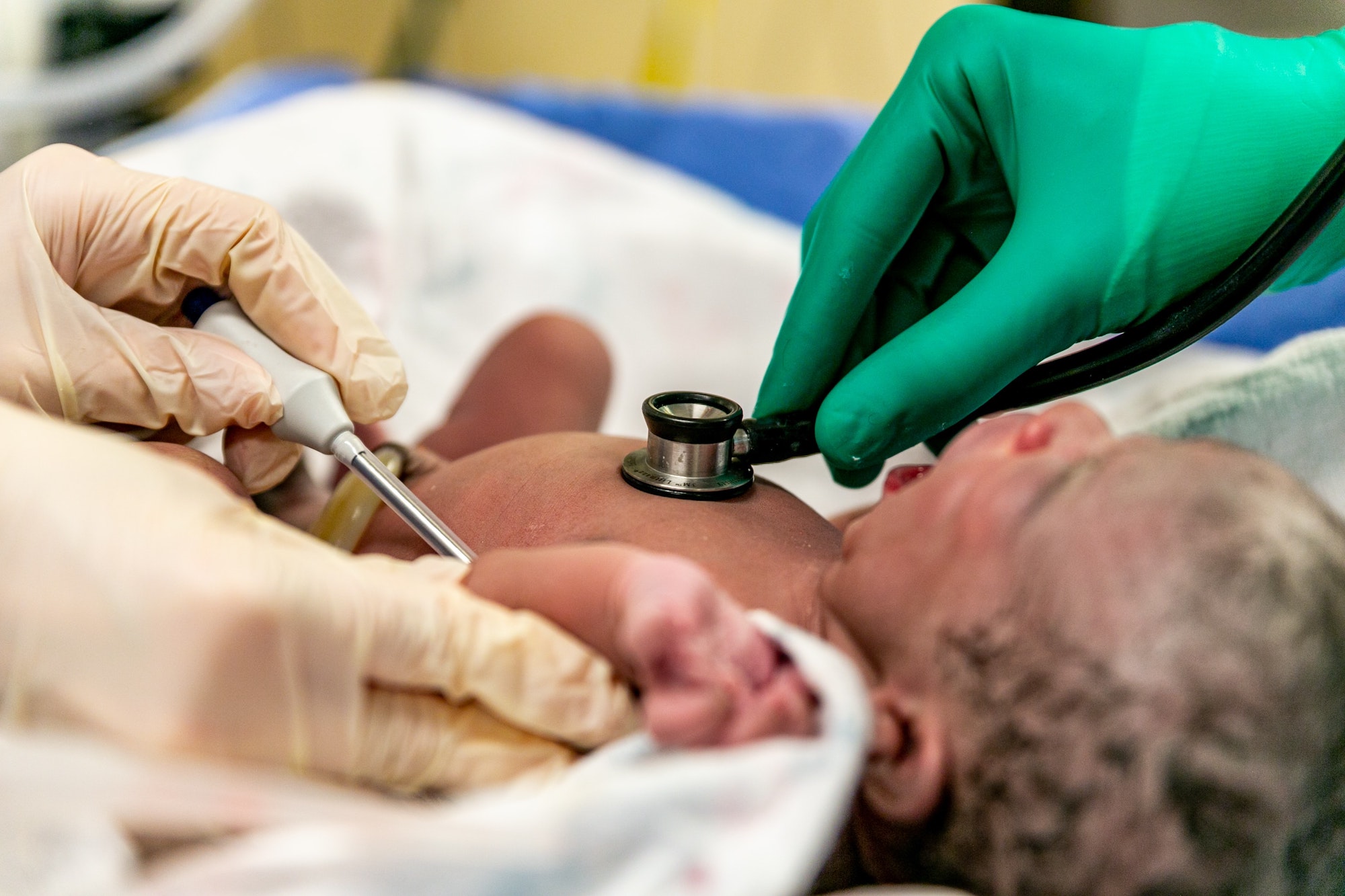
Mississippi is also a national leader in stillbirth rates alongside other southern states like Alabama and Georgia, all of which have passed abortion restrictions in recent years. During the COVID-19 pandemic, stillbirths have doubled among unvaccinated pregnant women who contract the illness, and at least 15 pregnant women have died of COVID-19.
About 14.5% of babies in the state are born prematurely—nearly double the national rate of 9.3%. The state also leads the nation in low-birth-weight births, with 11.8% of babies born weighing less than 5.5 pounds; the national average is 8.3%. In some parts of Mississippi, the situation is even more dire.
A 2020 report found that 24.4% of babies born in the Mississippi Delta’s majority-Black Issaquena County weigh less than 5.5 pounds—a statistic triple the national average. WLBT recently interviewed a woman in the county who said “had to drive more than an hour to the nearest hospital while having contractions.” Issaquena County has no hospitals and few health-care providers and, like half of the state’s counties, does not have any OBG-YNs.
Fitch Asked Court to Kill ACA, Medicaid Expansion
In 2019, a Mississippi State Department of Health expert told this reporter in a story for another publication that Medicaid expansion could help improve the state’s rankings. The program could also help keep financially embattled rural hospitals afloat, several of which have closed in recent years. Expansion would make as many as 300,000 working-poor Mississippians eligible for Medicaid under the federal 2010 Patient Protection and Affordable Care Act.
While Mississippi Lt. Gov. Delbert Hosemann, the Republican Senate president, has expressed support for Medicaid expansion, other top Republicans in the state oppose the idea, including House Speaker Philip Gunn and Gov. Tate Reeves.
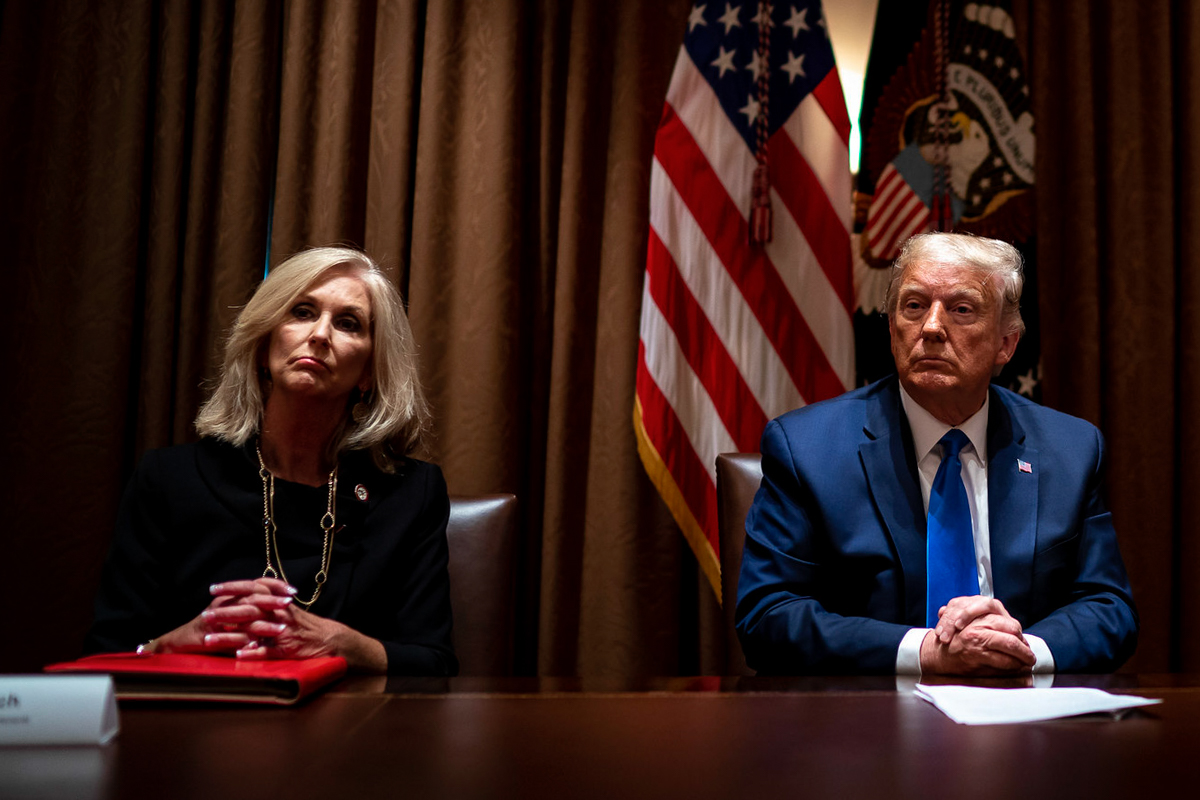
Last year, Fitch was one of 18 Republican attorneys general who asked the U.S. Supreme Court to invalidate the ACA. If the court had done so, it would have ended the possibility for Medicaid expansion in the state while also ending health coverage for more than 110,000 Mississippians who receive federal ACA subsidies to afford insurance. In June, the nation’s high court rejected Fitch and other Republicans’ arguments, including those made by the Trump administration last year, and allowed former President Barack Obama’s signature health-care law to stand.
In Mississippi, about 25,000 pregnant people use Medicaid to cover pregnancy, but lose health benefits 60 days after birth. Earlier this year, the Mississippi Legislature considered expanding those Medicaid benefits for a year postpartum, but lawmakers killed the extension in the last days of the 2021 session.
‘It Is A Case Chosen By God’
During the Sept. 24 EWTN interview, Fitch framed her argument for overturning Roe v. Wade in terms of the idea that ending abortion access will not limit women’s choices, but broaden them.
“Just think about the uplifting, the changing of course for women that have for these new babies, these women. And everyone knows it’s all right, it’s acceptable. You can have these beautiful children and you can have your careers,” Fitch told EWTN. “And so this really gets into, how do we empower women? How do we prepare for that next step? And we have to look at it with this whole vision and strategy. And I just think God has given us this opportunity to be here.”
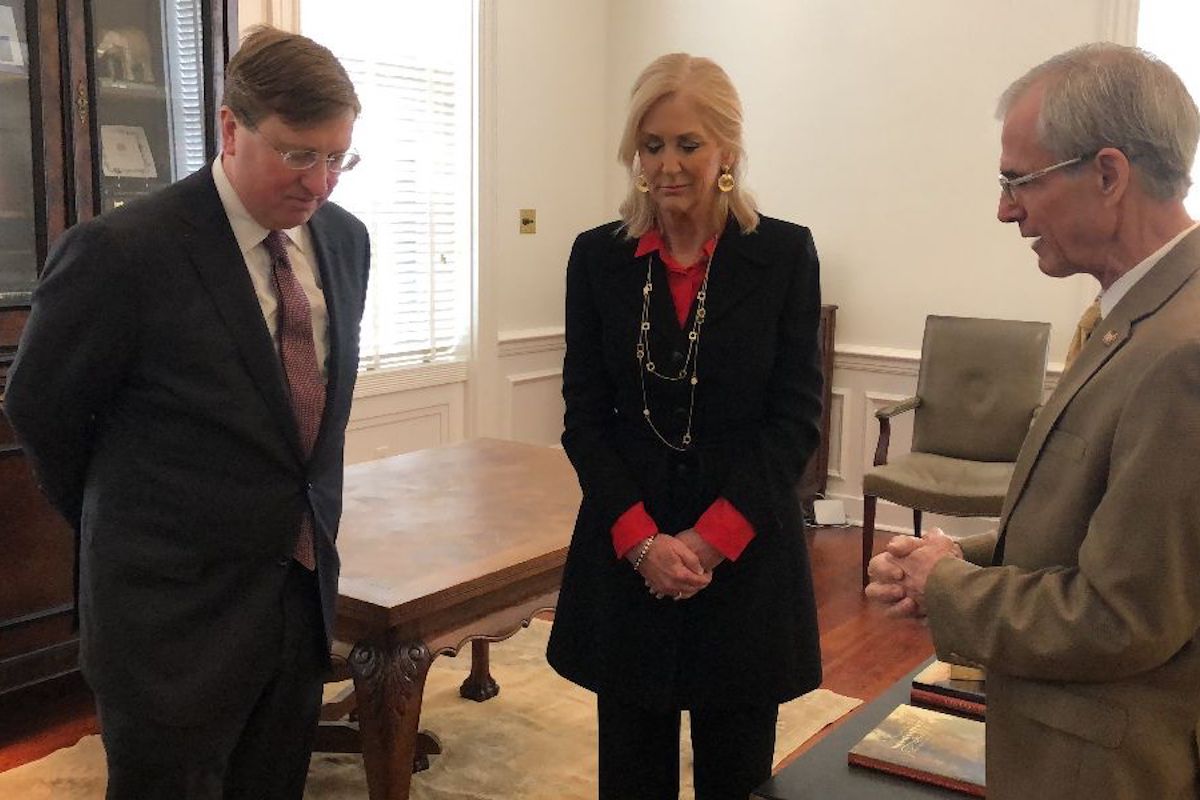
Fitch also repeatedly cited her belief that divine providence is playing a role in the Dobbs case.
“It is truly exciting. It is a case chosen by God. We get the opportunity to make this argument a lot, Roe v. Wade and Casey v. Planned Parenthood are not substantial cases and it should be overturned. There’s no constitutional right,” Fitch told Hadro.
In a brief on Sept. 14, 2021, attorneys for Mississippi’s only abortion clinic, the Jackson Women’s Health Organization, said that Fitch’s request to overturn Roe v. Wade ignores the “vital liberty and equality interests of those who would be affected by the radical change” ending Roe v. Wade would bring about.
But Fitch claimed during the EWTN interview that the case is about “state’s rights”—a concept elected officials have often invoked throughout Mississippi’s history, including in defense of slavery, segregation and the state’s now-defunct same-sex marriage ban.
“It is an opportunity for the states’ interests, the state’s rights to be brought up. Because the bottom line is this is a rule of law case. It’s about rule of law,” Mississippi’s attorney general said.
In 1980, Ronald Reagan, known as the first presidential candidate to campaign on an aggressively anti-abortion platform, spoke of his support for “state’s rights” during a campaign stop at Mississippi’s Neshoba County Fair near where the FBI had recovered the bodies of three civil rights workers 16 years before Reagan’s speech. Klansmen from Neshoba County and nearby Meridian had kidnapped and murdered them because they were working for racial equality, including the right to vote, which the State of Mississippi had long denied Black citizens. A State-funded spy agency, the Mississippi Sovereignty Commission, had provided the men’s license-plate number and other “intelligence” to Klansmen, local law enforcement among them. During the EWTN interview, Fitch said abortion “needs to be returned to the states.”
“States protect. They are the ones who have the legislators, the governors, that we all elect,” Mississippi’s attorney general said. “And their job is to act upon the will of the people, to act upon what’s in the best interests of the people of the state. And that’s what they do, and if they aren’t doing that, then they have to be held accountable, and certainly people can go to the ballot box and change that.”
The day before the interview, though, attorneys from Fitch’s office asked a federal court in New Orleans to uphold a Jim Crow law in Mississippi’s 1890 constitution that permanently takes the right to vote away from residents who have committed certain felonies in the past. The drafters of the 1890 constitution proclaimed at the time that their goal was to prevent as many Black people from voting as possible. Even today, the provision disenfranchises tens of thousands of residents, most of them Black.
The U.S. Supreme Court alarmed abortion-rights activists in late August after allowing a Texas law that bans almost all abortions after six weeks to go into effect. That law has drawn comparisons to fugitive slave laws because, instead of using the state to enforce it, the Texas law gives citizens the right to sue anyone they believe participated in an abortion after six weeks of pregnancy.
The U.S. Supreme Court is set to hear arguments in Dobbs v. Jackson Women’s Health Organization on Dec. 1, 2021.


